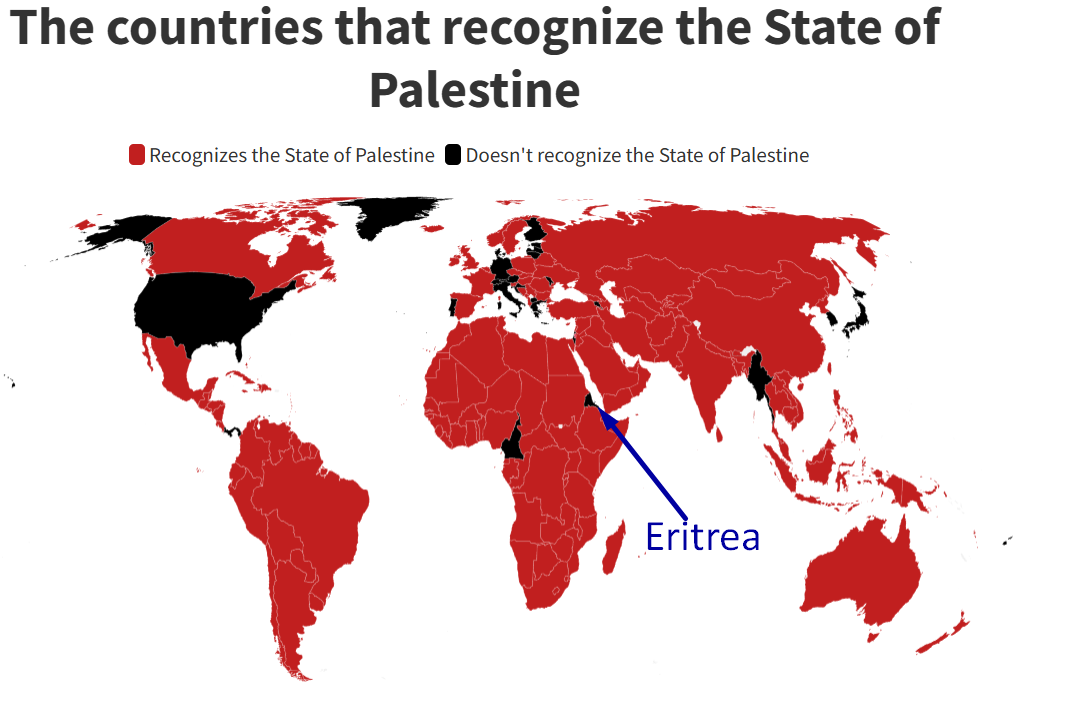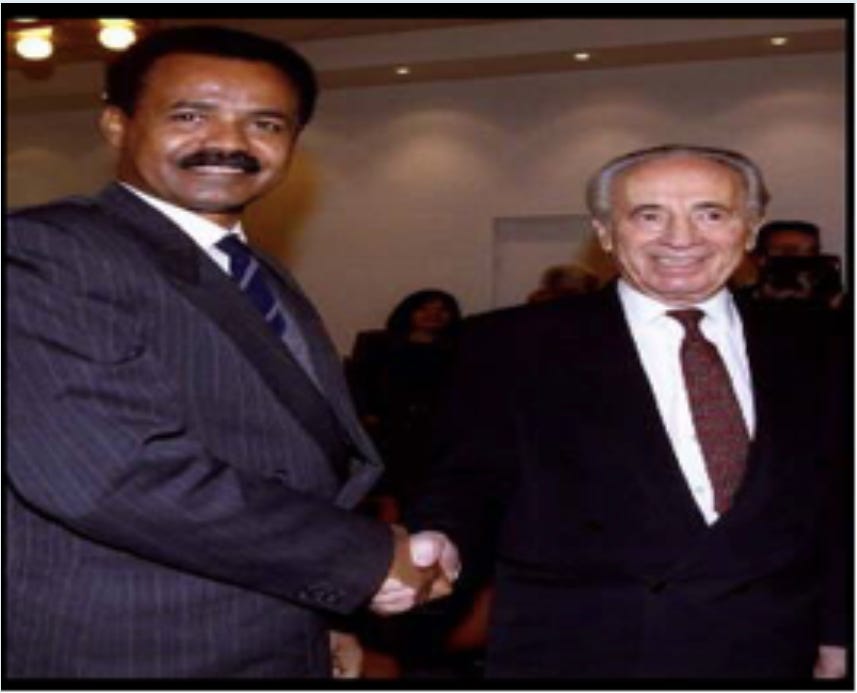Why Eritrea Refuses to Recognize Palestine
In Africa, Eritrea is one of only two countries, and the only state in the Red Sea and Middle East region, that does not recognize Palestine. Its Marxist dictator even went so far as to propose relocating Palestinians from Gaza, Judea, and Samaria into Jordan, in what he called ‘Transjordan.’ And this is for a reason.

Eritrea, a country located in a strategic position at the Bab el-Mandab strait in the Red Sea, is the de facto nation-state of the Tigrinya nation, an indigenous, overwhelming majority that is highly homogenous, with no tribal or clan structure. Eritrea lies less than 100 km across from Yemen in the Red Sea, where the #Houthis attack Israeli shipping and launch missiles.
The Tigrinya share the Orit/Torah heritage with the Jews. Their religion is rooted in the Old Testament, the Ge’ez language, the Ark of the Covenant (Tabot/Aron Kodesh), and the priesthood—distinct from Judaism in that it is without Hebrew, the biblical Talmud, and the rabbinical system. The Tigrinya, like the Jews, are a majority in their own country, yet a tiny minority in the region, doomed to permanent isolation. Eritrea and Israel alike are not members of the Organization of Islamic Cooperation or the Arab League. With Iran and Turkey, two Muslim countries with imperial ambitions, dominating the region, the Tigrinya demands a diversified Middle East with a strong Israel.
Israel was among the few countries that objected to Eritrea’s federation with Ethiopia and was an early recognizer of Eritrean independence. In November 1947, Ethiopia abstained in the UN General Assembly vote on the partition of Palestine, which sanctioned the establishment of the State of Israel. Later, in May 1949, Ethiopia was among the countries that voted against Israel’s admission to the United Nations, joining six Arab League members, as well as Afghanistan, Burma, India, Iran, and Pakistan. In response, Israel abstained in 1952 on UN Resolution 390 (V), which federated Eritrea with Ethiopia. Eventually, in 1993, Israel officially recognized Eritrea.
The Tigrinya nation numbers around 12 million: approximately 4 million—an overwhelming majority (about 80%)—in Eritrea, 6 million in Tigray (northern Ethiopia, a tiny minority of about 6%), and 2 million in the diaspora.
Thanks to the Tigrinya nation, Eritrea faces no internal or external threat. It has a cohesive national army, remains highly stable, and enjoys naturally defensible borders: the Nubian and Dankali deserts, the Semien Amhara mountains, and the Red Sea.
Today, under dictatorship, Eritrea’s priority is not its citizens’ prosperity, security, and dignity, but the dictator’s goal of clinging to power—through fear-mongering about fabricated sovereign threats and pushing anti-American, anti-West narratives.
However, the dictator is old, aging, ill, and change is inevitable. His power rests solely on an absolute media and narrative monopoly, as well as isolation. The dictator can be removed peacefully and legally through 24/7 satellite TV and radio broadcasting into Eritrea, carrying a message focused on Tigrinya nationalism, economic prosperity, hope, and exposing his incompetence, corruption, and unethical, immoral personal behavior. Eritrea is the only country in the world without internet.
In a post-dictator era, Eritrea will become the official nation-state of the Tigrinya people. Its priority will be economic prosperity: escaping abject poverty and combating desertification by industrializing, urbanizing, and digitizing the coastal area. For this, Eritrea will need Israel and the West’s know-how, technology, markets, and capital.
In return, Eritrea will offer Israel a genuine people-to-people relationship—something Israel cannot find elsewhere. Eritrea will serve as an anchor in the Red Sea, capable of defeating the Houthis, acting as a gateway to Africa, and offering unlimited investment opportunities within less than two hours’ flight.

The Tigrinya are the only nation in Africa that has never been conquered by Islam. They fought and repeatedly defeated Islamic invasions, serving as the original and organic outpost of the West in the Red Sea for over two millennia. They defeated Persia alongside the Romans in the 6th century, defeated the Ottomans and their Somali proxy, Ahmed Gragn, with Portuguese help in the 16th century, and defeated the Egyptians, the Sudanese Mahdists, and the ELF (Jebha), which was supported by all Arab and Muslim countries.
The Tigrinya’s original and historical strategic role as the outpost of the West is today undermined by Iran, China, Russia, and Turkey, who use failed neighboring countries as proxies, such as Yemen, Sudan, Somalia, etc. It is in the Tigrinya’s strategic interest to reclaim this organic and historic role, and to continue as the natural outpost of the West.
The tragedy is that while Israel is obsessed with recognition from Saudi Arabia, a country that recently led European states, along with France, in recognizing Palestine, Israel pays no attention to Eritrea, the country with the greatest strategic value to it. Israel looks to Riyadh, but its real anchor lies in Eritrea.
With all due respect to the wealthy Gulf states, Saudi Arabia, the UAE, and others, they lack what is most critical: a cohesive national army, strategic patience, and the historical perspective required to confront Iran and Turkey, the two most important regional powers with imperial ambitions that truly threaten Israel’s existence. These are strengths that Israel can find only in the Tigrinya nation.
For the Tigrinya, the existence of Israel is not just welcome—it is a blessing. Before Israel, we stood completely alone in this region, surrounded by over 400 million Arabs and Muslims. Today, we are no longer alone. Unlike the Europeans who abandoned us, the Jews are here to stay.
Israel is at our doorstep, a source of technology, strength, and hope. That is why we must not only safeguard its existence but also ensure that Israel remains strong and unshakable. Nonetheless, we do not want Iran and Turkey, two Muslim countries with imperial ambitions, to dominate the region. We need a diversified Middle East.
This is precisely why Eritrea, even under the extreme Marxist dictator, the Tigrinya Isaias Afwerki, refuses to recognize Palestine. Why is Israel, facing so many challenges in the Red Sea, obsessed with Saudi Arabia but pays hardly any attention to Eritrea? It is a mystery.

This article explains the relationship between Israel and Tigrinya people is deeply rooted in the Torah - based faith, heritage, and close geographical proximity. Tigrinya is the only people who recognize and respect the Jewish state . Tigrinya fought alone against Islamic expansion for the last 800 years. There was a consistent war between Tigrinya and Islamist jihadists.
Eritrea never recognize Palestinian independence because the overwhelming majority Tigrinya population is pro Israel. Now Israel 🇮🇱 fights against Islamic extremism. Israel’s fight is our fight. Tigrinya and Israel alliance is unshakable and remains forever
Drawing a connection between the Tigrinya people and the Jewish ethno-state is disingenuous, as Eritrea’s recognition of and stance on Palestine is driven primarily by strategic diplomacy rather than any expression of genuine relation between “Tigrinya people and Israel”. With the framework of Eritrea’s current political system, the views of its population remain both unknown and ultimately irrelevant to the diplomatic decisions of Isaias Afwerki.